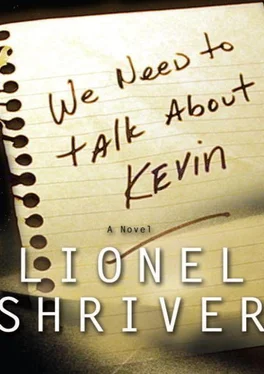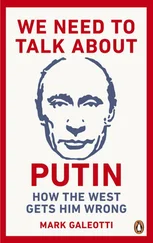The previous owners must have installed those floodlights in the back in expectation of lavish garden parties. We didn’t incline toward garden parties and rarely used the floods, but I was familiar with the switch: just to the left of the pantry, beside the sliding glass doors that opened to our banked backyard. This was where I used to stand and watch you throw a baseball with Kevin, feeling wistful, left out. I felt a little that way at that moment—left out. As if you’d held some family celebration of great sentimental significance, and of all people I hadn’t been invited. I must have kept my hand on that switch a good thirty seconds before I flipped it. If I had it to do over again, I’d have waited a few moments more. I would pay good money for every instant in my life without that image in it.
On the crest of the hill, the archery range lit up. Soon I would understand the drollery behind Kevin’s lunchtime phone call to Lamont, when he’d apparently told Robert not to bother to pick up Celia from school, since she was “unwell.” Backed against the target was Celia—standing at attention, still and trusting, as if eager to play “William Tell.”
As I wrenched the door open and flailed up the rise, my haste was irrational. Celia would wait. Her body was affixed to the target by five arrows, which held her torso like stick-pins tacking one of her crimped self-portraits to a class bulletin board. As I stumbled nearer calling her name, she winked at me, grotesquely, with her head knocked back. Though I remembered putting in her prosthesis that morning, it was missing now.
There are things we know with our whole being without ever having to actively think them, at least with that verbal self-conscious prattle that chatters on the surface of our minds. It was like that; I knew what else I would find without having to specify it to myself outright. So when, scrambling up to the archery range, I tripped over something sticking from bushes, I may have sickened, but I wasn’t surprised. I recognized the obstacle in an instant. I had bought pairs of chocolate-brown Stove brogans from Banana Republic often enough.
Oh, my beloved. I may need too badly to tell myself a story, but I’ve felt compelled to weave some thread of connection between the otherwise meaningless dishevelment of that backyard and the finest in the man I married.
With a good twenty minutes remaining before they had to leave for school, you’d let the kids go out to play. In fact, it would have encouraged you that for once the two of them were horsing around together— bonding . You dawdled through the Times , though it was the Home C-section on a Thursday, which wouldn’t entice you. So you started on the breakfast dishes. You heard a scream. I don’t doubt that you were out the sliding doors in a flash. From the bottom of the hill, you went for him. You were a robust man, even in your fifties, still skipping rope forty-five minutes a day. It would have taken a lot to stop a man like you in his tracks. And you almost made it, too—a few yards from the crest, with the arrows raining.
So here is my theory: I believe you paused. Outside on the deck, with our daughter pinioned to an archery target with an arrow through her chest, while our firstborn pivoted on his mound and sighted his own father down the shaft of his Christmas crossbow, you simply didn’t believe it. There was such a thing as a good life. It was possible to be a good dad, to put in the weekends and the picnics and the bedtime stories, and so to raise a decent, stalwart son. This was America. And you had done everything right. Ergo, this could not be happening.
So for a single, deadly moment this overweening conviction—what you wanted to see—fatally interposed itself. It is possible that your cerebrum even managed to reconfigure the image, to remix the sound track: Celia, pretty make-the-best-of-it Celia, darling look-on-the-bright-side Celia, is once more inured to her disability and tossing her fine gold hair cheerfully into the spring breeze. She isn’t screaming, she’s laughing. She’s shrieking with laughter. The only reason Kevin’s helpful girl Friday could conceivably be standing right in front of the target is to faithfully collect her brother’s spent arrows—ah, Franklin, and wouldn’t she. As for your handsome young son, he has been practicing archery for six years. He has been scrupulously instructed by well-compensated professionals, and he is nothing if not safety conscious. He would never point a loaded crossbow at another person’s head, least of all at his own father’s.
Clearly, the sunlight had played some visual trick. He is merely waving an upraised arm. He must be hoping, without saying as much—he is a teenager, after all—to apologize for lashing out at breakfast with those harsh, ugly repudiations of everything his father has tried to do for him. He is interested in how the Canon works, and he hopes you’ll explain what “f-stop” means another time. In truth he deeply admires his father’s enterprise in having seized upon such a quirky profession, one that allows such creative latitude and independence. It’s just awkward for an adolescent boy. They get competitive at this age. They want to take you on. Still the boy feels awful now, for having let fly. The fit of pique was all a lie. He treasures all those trips to Civil War battlefields, if only because war is something that only men can understand with other men, and he’s learned one heck of a lot from museums. Back in his room some nights, he takes out those autumn leaves you two collected on the grounds of Theodore Roosevelt’s ancestral home and pressed inside the Encyclopedia Britannica last year. Seeing that the colors are beginning to fade reminds him of the mortality of all things, but especially of his own father, and he cries. Cries . You will never see it; he will never tell you. But he doesn’t have to. See? The waving? He’s waving for you to bring the camera. He’s changed his mind, and with another five minutes left before he has to catch the bus, he wants you to take some photographs after all—to start the montage, Braveheart of the Palisades, for the foyer.
This masterful remake may not have lasted more than a second or two before it corrupted, as a frozen frame will blister and crenellate before a hot projection lamp. But it would have lasted just long enough for Kevin to sink his first crippling shaft—perhaps the one I found angled through your throat and protruding from the back of your neck. It must have severed an artery; around your head, under the flood lamps, the grass was black. The three other arrows—stuck in the hollow between your pectorals where I loved to rest my head, fixed fast into the fibrous muscle of your broad rope-skipping calf, and extending from the groin whose pleasures we had so recently rediscovered together—were just-to-be-on-thesafe-side touches, like a few extra stakes around the edges of a well-pitched tent.
All the same, I do wonder just how hard you struggled up that hill, really—wheezing, beginning to choke on your own blood. It wasn’t that you didn’t care for her, but you may have grasped with a glance that it was too late to save Celia. The fact she was no longer screaming was a bad sign. As for saving yourself, maybe it just wasn’t in you. Stark in the glare of the floods, sharpened by the shadow cast by the shaft in your neck, the expression on your face—it was so disappointed.
Eva
Dearest Franklin,
I don’t know if you keep up with these things, but about a week ago a Chinese fighter plane ran into an American surveillance craft over the South China Sea. The Chinese pilot was probably drowned, and the crippled American spy plane landed on the Chinese island of Hainan. There seems to be some question as to whose craft hit whose. Anyway, it’s become quite a diplomatic showdown, and now China is holding the twenty-four American crew members hostage—for an apology, of all things. I haven’t had the energy to follow who is and is not at fault, but I have been intrigued that world peace (or so they say) hangs in the balance over the sole matter of remorse. Previous to my education in such things, I might have found the situation exasperating. Just say you’re sorry then, if that will get them back! But nowadays the matter of remorse looms great to me, and it neither surprises nor frustrates me that momentous events might be decided in accordance with it. Besides, so far this Hainan conundrum is relatively simple. It is so much more often the case that an apology brings no one back.
Читать дальше












